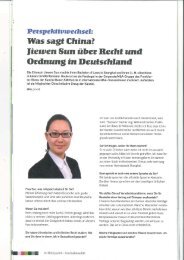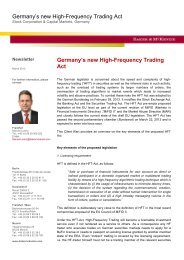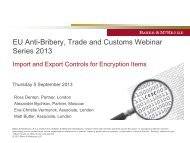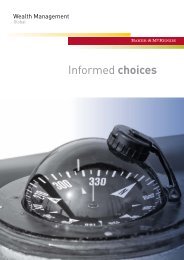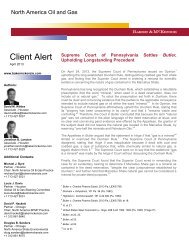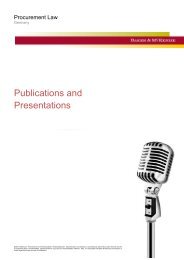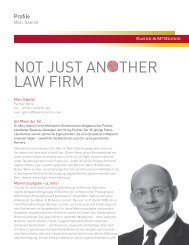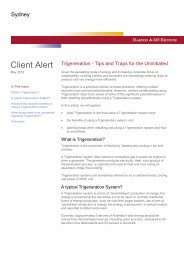Read publication - Baker & McKenzie
Read publication - Baker & McKenzie
Read publication - Baker & McKenzie
You also want an ePaper? Increase the reach of your titles
YUMPU automatically turns print PDFs into web optimized ePapers that Google loves.
Canada<br />
has unnecessarily delayed the litigation process. Outside of civil litigation, the taxpayer<br />
can only be required to pay for the CRA’s administrative costs in limited (voluntary)<br />
circumstances. 52 Similarly, the tax authorities will not be responsible for costs incurred<br />
by taxpayers in the course of preparing their tax filings or resolving disputes out of<br />
court. However, taxpayers will normally be able to deduct such expenses for income tax<br />
purposes. 53<br />
Costs awards in the criminal context are very rare. Criminal courts tend to use<br />
costs awards in only two circumstances: to control abuses of court process or in response<br />
to the infringement or denial of an accused taxpayer’s fundamental rights.<br />
VII<br />
ALTERNATIVE DISPUTE RESOLUTION<br />
i General principles and settlement<br />
The CRA has a statutory obligation to assess taxes based solely on its appreciation of<br />
the facts and in accordance with what it considers to be the correct interpretation of the<br />
law. 54 As a result, the CRA has no authority to enter into compromise settlements with<br />
taxpayers based on external considerations such as the costs involved or the risks inherent<br />
in litigating a tax dispute in court. For the same reasons, it is not possible for taxpayers<br />
and Canadian tax authorities to subscribe to private arbitration for the resolution of tax<br />
disputes. Although private non-binding mediation is available, it is very rarely used in<br />
practice. Nevertheless, taxpayers can take advantage of a number of additional avenues<br />
for seeking relief, whether prior to undertaking a particular transaction, following the<br />
completion of that transaction, or in response to unreasonable or abusive conduct at the<br />
hands of a Canadian tax authority. 55<br />
ii Before the transaction<br />
Prior to entering into a proposed transaction, taxpayers may request an advance ruling<br />
as to how the CRA will interpret particular tax provisions in respect of the transaction.<br />
Similarly, they may request a technical interpretation of tax provisions, which is not tied<br />
to a proposed transaction. Both the rulings and the technical interpretation procedures<br />
are creatures of administrative practice and discretion. 56 Although the CRA will normally<br />
consider itself bound by advance rulings, this is not so with technical interpretations, and<br />
the CRA may refuse to provide either a ruling or a technical interpretation in various<br />
52 For example, with respect to taxpayers’ requests for advance tax rulings from the CRA, or the<br />
assembly and disclosure of information under statutory access to information regimes.<br />
53 See, e.g., s. 60(o).<br />
54 See, e.g., Galway v. Minister of National Revenue, [1974] 1 F.C. 600, 74 D.T.C. 6355 (C.A.);<br />
CIBC World Markets Inc v. Canada, 2012 FCA 3, 2012 G.T.C. 1011.<br />
55 In addition to the alternative dispute resolution avenues identified above, taxpayers may also<br />
consider active lobbying aimed at achieving a change in the law that gives rise to their tax<br />
dispute.<br />
56 See CRA, Information Circular IC70-6R5, ‘Advance Income Tax Rulings’ (17 May 2002).<br />
32



